一:环境是VS2008,python3.7(32-bit)
由于python是32位,只能用32位工程。用64为工程兼容性问题会报错
(1)创建pthon脚本文件:Hello.py
def Hello():
print("hello boy!");
(2)用vs2008创建32为控制台工程CUsePython
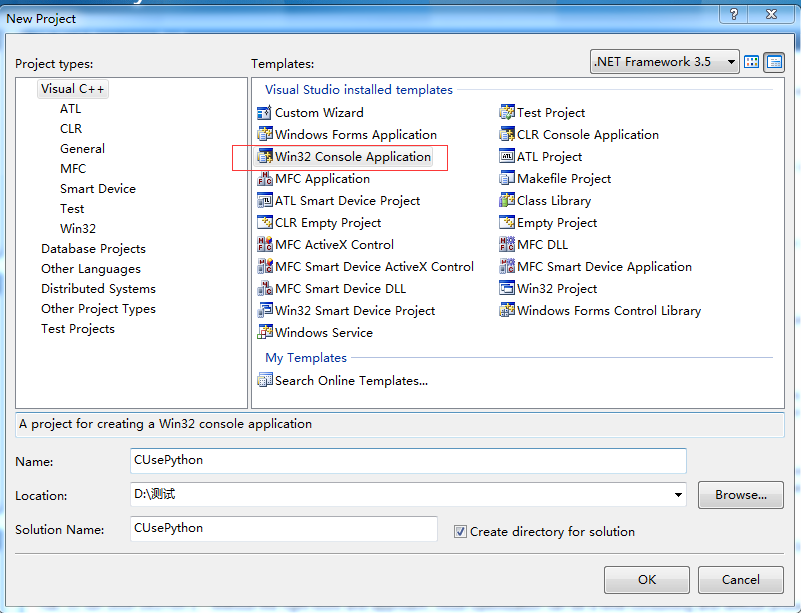
(3)将python文件的include、libs文件,和创建好的脚本文件Hello.py文件拷贝到工程CUsePython中
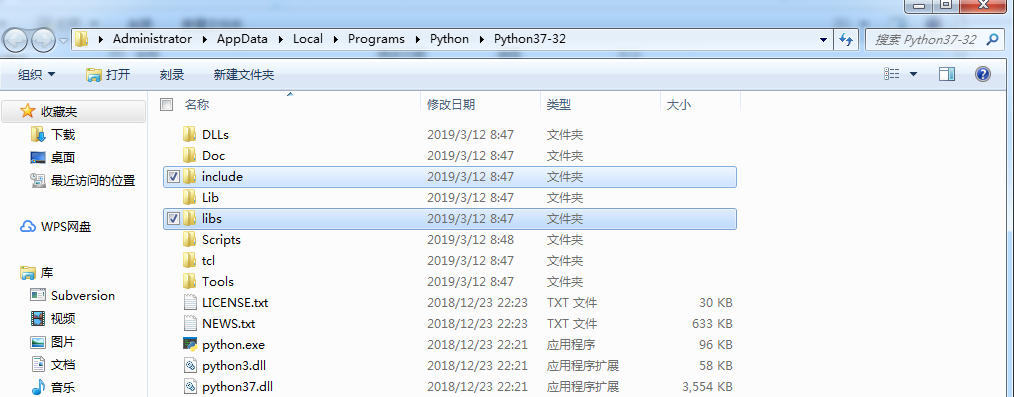
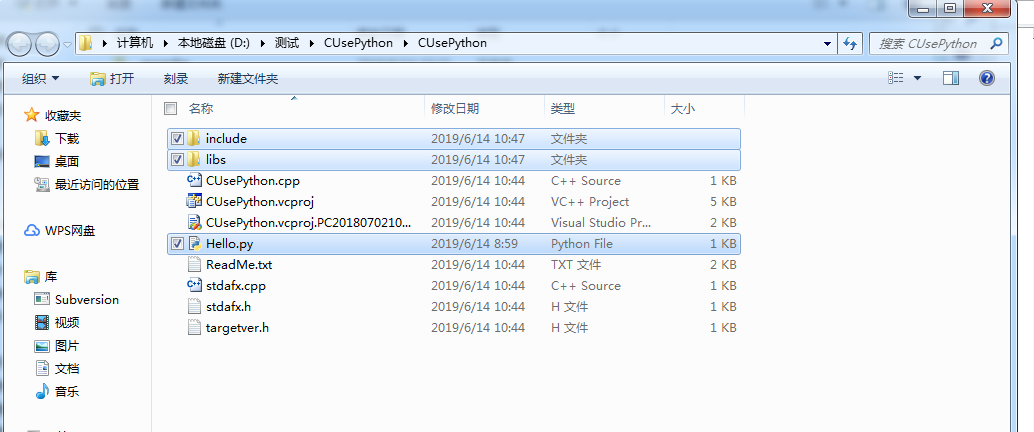
(4)工程属性中添加库、设置属性,注意:你得libs下的python37.lib对应的是release编译,python37_d.lib对应的是debug编译。如果两个都有,release, debug都可以。我的环境只有python37.lib所以我选择release编译
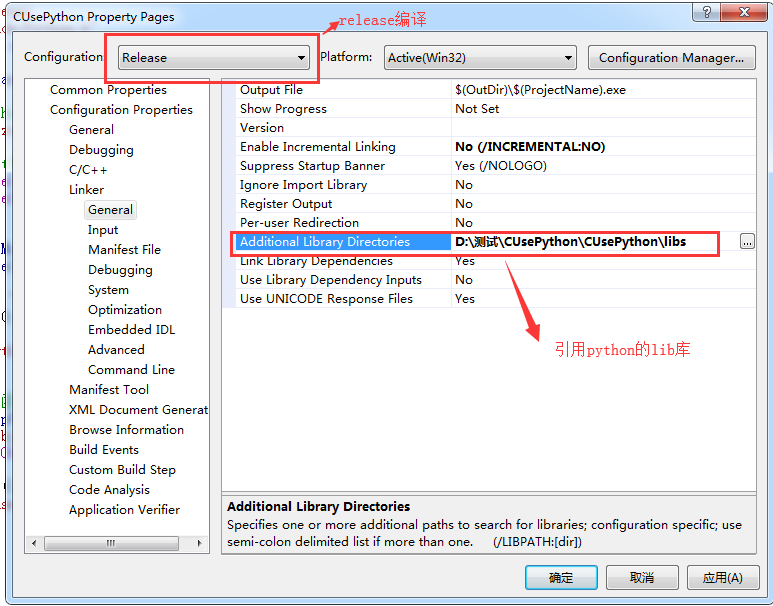
(5)在工程文件CUsePython.cpp添加如下代码
// CUsePython.cpp : Defines the entry point for the console application.
//
#include "stdafx.h"
#include <stdlib.h>
#include <iostream>
#include "include/Python.h"
using namespace std;
int _tmain(int argc, _TCHAR* argv[])
{
//初始化Python环境
Py_Initialize();
//添加Insert模块路径
PyRun_SimpleString("import sys");
PyRun_SimpleString("sys.path.append('./')");
//导入模块
PyObject* pModule = PyImport_ImportModule("Hello");
if (!pModule)
{
cout << "Python get module failed." << endl;
return 0;
}
cout << "Python get module succeed." << endl;
//获取Hello函数
PyObject * pFunc = NULL;
pFunc = PyObject_GetAttrString(pModule, "Hello");
PyEval_CallObject(pFunc, NULL);
Py_Finalize();
system("pause");
return 0;
}
(6)编译运行,可能会出现如下错误

由于C++调用python需要inttypes.h、stdint.h文件。 拷贝到VS的VCbin文件夹下。是我的VCbin做为参考。同时拷贝到CUsePyhoninclude下
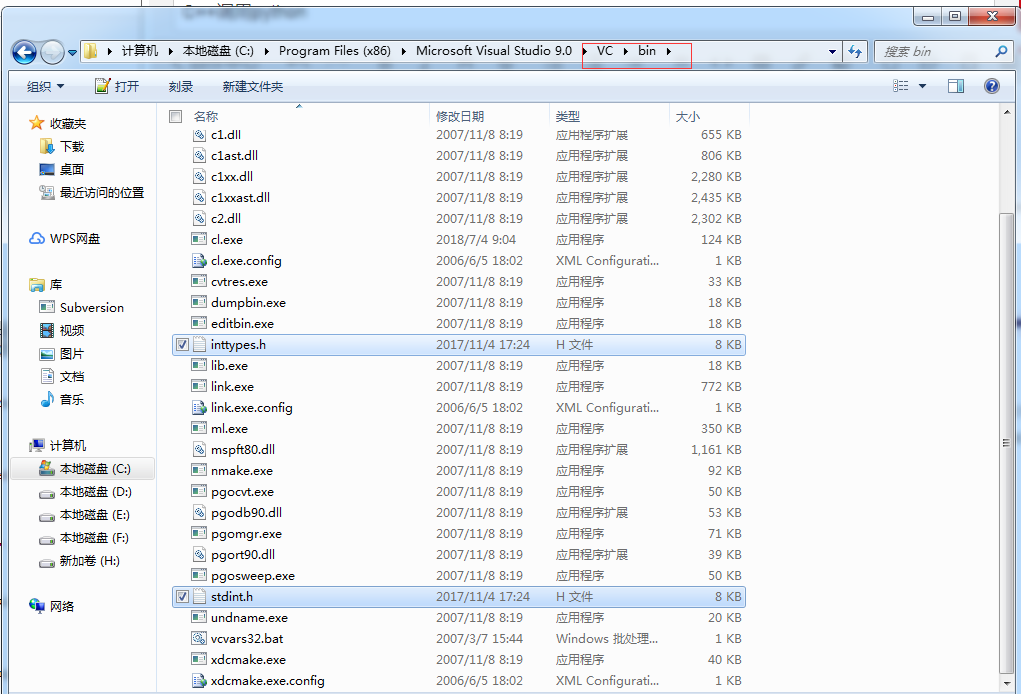
将报错地方#include <inttypes.h> 改成#include “inttypes.h”

(7)运行成功结果
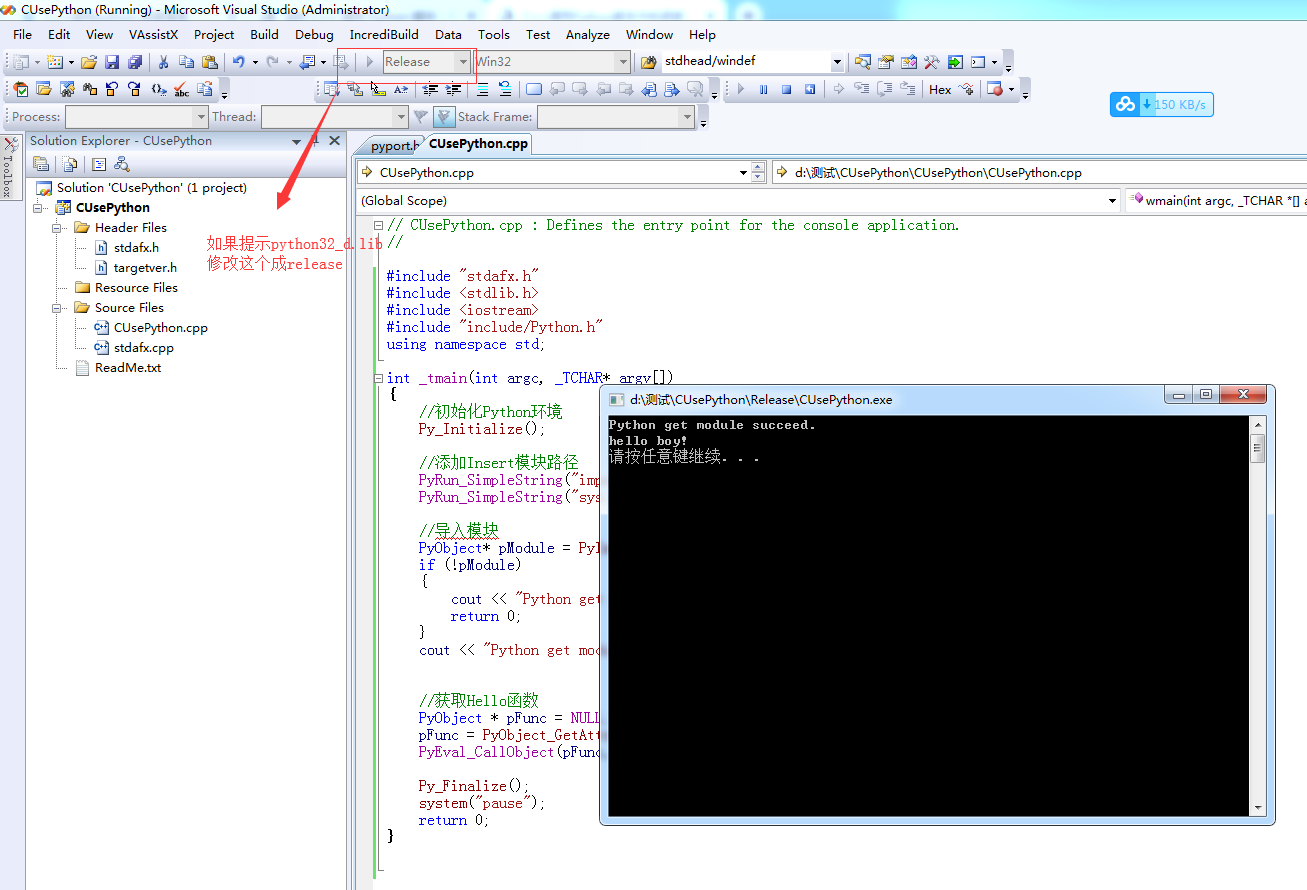
//
注:
inttypes.h、stdint.h可以在网上下载。如果不想网上下载。自己创建inttypes.h、stdint.h添加如下内容
inttypes.h
#ifndef _INTTYPES_H_ALL_
#define _INTTYPES_H_ALL_
// _INTTYPES_H_SYS_: 编译器是否提供了<inttypes.h>
#undef _INTTYPES_H_SYS_
#if defined(__GNUC__) // GCC.
#define _INTTYPES_H_SYS_
#elif defined(_MSC_VER) // MSVC. VC2010仍不支持.
#elif defined(__BORLANDC__) // BCB. BCB6仍不支持.
#else
#define _INTTYPES_H_SYS_ // 假设其他编译器支持C99.
#endif // _INTTYPES_H_SYS_
#ifdef _INTTYPES_H_SYS_
// 使用编译器提供的<inttypes.h>
#include <inttypes.h>
#else
// 采用自定义的inttypes.h. 参考了 msinttypes: http://code.google.com/p/msinttypes/
#ifndef _MSC_INTTYPES_H_ // [
#define _MSC_INTTYPES_H_
#include "stdint.h"
// 7.8 Format conversion of integer types
typedef struct {
intmax_t quot;
intmax_t rem;
} imaxdiv_t;
// 7.8.1 Macros for format specifiers
#if !defined(__cplusplus) || defined(__STDC_FORMAT_MACROS) // [ See footnote 185 at page 198
// The fprintf macros for signed integers are:
#define PRId8 "d"
#define PRIi8 "i"
#define PRIdLEAST8 "d"
#define PRIiLEAST8 "i"
#define PRIdFAST8 "d"
#define PRIiFAST8 "i"
#define PRId16 "hd"
#define PRIi16 "hi"
#define PRIdLEAST16 "hd"
#define PRIiLEAST16 "hi"
#define PRIdFAST16 "hd"
#define PRIiFAST16 "hi"
#if defined(_MSC_VER) && _MSC_VER<=1200 // VC6
#define PRId32 "d"
#define PRIi32 "i"
#define PRIdLEAST32 "d"
#define PRIiLEAST32 "i"
#define PRIdFAST32 "d"
#define PRIiFAST32 "i"
#else
#define PRId32 "I32d"
#define PRIi32 "I32i"
#define PRIdLEAST32 "I32d"
#define PRIiLEAST32 "I32i"
#define PRIdFAST32 "I32d"
#define PRIiFAST32 "I32i"
#endif
#define PRId64 "I64d"
#define PRIi64 "I64i"
#define PRIdLEAST64 "I64d"
#define PRIiLEAST64 "I64i"
#define PRIdFAST64 "I64d"
#define PRIiFAST64 "I64i"
#define PRIdMAX "I64d"
#define PRIiMAX "I64i"
#define PRIdPTR "Id"
#define PRIiPTR "Ii"
// The fprintf macros for unsigned integers are:
#define PRIo8 "o"
#define PRIu8 "u"
#define PRIx8 "x"
#define PRIX8 "X"
#define PRIoLEAST8 "o"
#define PRIuLEAST8 "u"
#define PRIxLEAST8 "x"
#define PRIXLEAST8 "X"
#define PRIoFAST8 "o"
#define PRIuFAST8 "u"
#define PRIxFAST8 "x"
#define PRIXFAST8 "X"
#define PRIo16 "ho"
#define PRIu16 "hu"
#define PRIx16 "hx"
#define PRIX16 "hX"
#define PRIoLEAST16 "ho"
#define PRIuLEAST16 "hu"
#define PRIxLEAST16 "hx"
#define PRIXLEAST16 "hX"
#define PRIoFAST16 "ho"
#define PRIuFAST16 "hu"
#define PRIxFAST16 "hx"
#define PRIXFAST16 "hX"
#if defined(_MSC_VER) && _MSC_VER<=1200 // VC6
#define PRIo32 "o"
#define PRIu32 "u"
#define PRIx32 "x"
#define PRIX32 "X"
#define PRIoLEAST32 "o"
#define PRIuLEAST32 "u"
#define PRIxLEAST32 "x"
#define PRIXLEAST32 "X"
#define PRIoFAST32 "o"
#define PRIuFAST32 "u"
#define PRIxFAST32 "x"
#define PRIXFAST32 "X"
#else
#define PRIo32 "I32o"
#define PRIu32 "I32u"
#define PRIx32 "I32x"
#define PRIX32 "I32X"
#define PRIoLEAST32 "I32o"
#define PRIuLEAST32 "I32u"
#define PRIxLEAST32 "I32x"
#define PRIXLEAST32 "I32X"
#define PRIoFAST32 "I32o"
#define PRIuFAST32 "I32u"
#define PRIxFAST32 "I32x"
#define PRIXFAST32 "I32X"
#endif
#define PRIo64 "I64o"
#define PRIu64 "I64u"
#define PRIx64 "I64x"
#define PRIX64 "I64X"
#define PRIoLEAST64 "I64o"
#define PRIuLEAST64 "I64u"
#define PRIxLEAST64 "I64x"
#define PRIXLEAST64 "I64X"
#define PRIoFAST64 "I64o"
#define PRIuFAST64 "I64u"
#define PRIxFAST64 "I64x"
#define PRIXFAST64 "I64X"
#define PRIoMAX "I64o"
#define PRIuMAX "I64u"
#define PRIxMAX "I64x"
#define PRIXMAX "I64X"
#define PRIoPTR "Io"
#define PRIuPTR "Iu"
#define PRIxPTR "Ix"
#define PRIXPTR "IX"
// The fscanf macros for signed integers are:
#define SCNd8 "d"
#define SCNi8 "i"
#define SCNdLEAST8 "d"
#define SCNiLEAST8 "i"
#define SCNdFAST8 "d"
#define SCNiFAST8 "i"
#define SCNd16 "hd"
#define SCNi16 "hi"
#define SCNdLEAST16 "hd"
#define SCNiLEAST16 "hi"
#define SCNdFAST16 "hd"
#define SCNiFAST16 "hi"
#define SCNd32 "ld"
#define SCNi32 "li"
#define SCNdLEAST32 "ld"
#define SCNiLEAST32 "li"
#define SCNdFAST32 "ld"
#define SCNiFAST32 "li"
#define SCNd64 "I64d"
#define SCNi64 "I64i"
#define SCNdLEAST64 "I64d"
#define SCNiLEAST64 "I64i"
#define SCNdFAST64 "I64d"
#define SCNiFAST64 "I64i"
#define SCNdMAX "I64d"
#define SCNiMAX "I64i"
#ifdef _WIN64 // [
# define SCNdPTR "I64d"
# define SCNiPTR "I64i"
#else // _WIN64 ][
# define SCNdPTR "ld"
# define SCNiPTR "li"
#endif // _WIN64 ]
// The fscanf macros for unsigned integers are:
#define SCNo8 "o"
#define SCNu8 "u"
#define SCNx8 "x"
#define SCNX8 "X"
#define SCNoLEAST8 "o"
#define SCNuLEAST8 "u"
#define SCNxLEAST8 "x"
#define SCNXLEAST8 "X"
#define SCNoFAST8 "o"
#define SCNuFAST8 "u"
#define SCNxFAST8 "x"
#define SCNXFAST8 "X"
#define SCNo16 "ho"
#define SCNu16 "hu"
#define SCNx16 "hx"
#define SCNX16 "hX"
#define SCNoLEAST16 "ho"
#define SCNuLEAST16 "hu"
#define SCNxLEAST16 "hx"
#define SCNXLEAST16 "hX"
#define SCNoFAST16 "ho"
#define SCNuFAST16 "hu"
#define SCNxFAST16 "hx"
#define SCNXFAST16 "hX"
#define SCNo32 "lo"
#define SCNu32 "lu"
#define SCNx32 "lx"
#define SCNX32 "lX"
#define SCNoLEAST32 "lo"
#define SCNuLEAST32 "lu"
#define SCNxLEAST32 "lx"
#define SCNXLEAST32 "lX"
#define SCNoFAST32 "lo"
#define SCNuFAST32 "lu"
#define SCNxFAST32 "lx"
#define SCNXFAST32 "lX"
#define SCNo64 "I64o"
#define SCNu64 "I64u"
#define SCNx64 "I64x"
#define SCNX64 "I64X"
#define SCNoLEAST64 "I64o"
#define SCNuLEAST64 "I64u"
#define SCNxLEAST64 "I64x"
#define SCNXLEAST64 "I64X"
#define SCNoFAST64 "I64o"
#define SCNuFAST64 "I64u"
#define SCNxFAST64 "I64x"
#define SCNXFAST64 "I64X"
#define SCNoMAX "I64o"
#define SCNuMAX "I64u"
#define SCNxMAX "I64x"
#define SCNXMAX "I64X"
#ifdef _WIN64 // [
# define SCNoPTR "I64o"
# define SCNuPTR "I64u"
# define SCNxPTR "I64x"
# define SCNXPTR "I64X"
#else // _WIN64 ][
# define SCNoPTR "lo"
# define SCNuPTR "lu"
# define SCNxPTR "lx"
# define SCNXPTR "lX"
#endif // _WIN64 ]
#endif // __STDC_FORMAT_MACROS ]
// 7.8.2 Functions for greatest-width integer types
// 7.8.2.1 The imaxabs function
#define imaxabs _abs64
// 7.8.2.2 The imaxdiv function
#ifdef _MSC_VER
// This is modified version of div() function from Microsoft's div.c found
// in %MSVC.NET%crtsrcdiv.c
#ifdef STATIC_IMAXDIV // [
static
#else // STATIC_IMAXDIV ][
_inline
#endif // STATIC_IMAXDIV ]
imaxdiv_t __cdecl imaxdiv(intmax_t numer, intmax_t denom)
{
imaxdiv_t result;
result.quot = numer / denom;
result.rem = numer % denom;
if (numer < 0 && result.rem > 0) {
// did division wrong; must fix up
++result.quot;
result.rem -= denom;
}
return result;
}
#endif // #ifdef _MSC_VER
// 7.8.2.3 The strtoimax and strtoumax functions
#define strtoimax _strtoi64
#define strtoumax _strtoui64
// 7.8.2.4 The wcstoimax and wcstoumax functions
#define wcstoimax _wcstoi64
#define wcstoumax _wcstoui64
#endif // _MSC_INTTYPES_H_ ]
#endif // #ifdef _INTTYPES_H_SYS_
#endif // #ifndef _INTTYPES_H_ALL_
stdint.h
#ifndef _STDINT_H_ALL_
#define _STDINT_H_ALL_
// _STDINT_H_SYS_: 编译器是否提供了<stdint.h>
#undef _STDINT_H_SYS_
#if defined(__GNUC__) // GCC.
#define _STDINT_H_SYS_
#elif defined(_MSC_VER) // MSVC. VC6至VC2005均没有, 似乎从VC2010才支持的.
#if _MSC_VER >=1600 // VC2010
#define _STDINT_H_SYS_
#endif // #if _MSC_VER >=1600 // VC2010
#elif defined(__BORLANDC__) // BCB. BCB6是支持的.
#if __BORLANDC__ >=0x0560 // BCB6
#define _STDINT_H_SYS_
#endif // #if __BORLANDC__ >=0x0560 // BCB6
#else
#define _INTTYPES_H_SYS_ // 假设其他编译器支持C99.
#endif // _STDINT_H_SYS_
#ifdef _STDINT_H_SYS_
// 使用编译器提供的<stdint.h>
#include <stdint.h>
#else
// 采用自定义的stdint.h. 参考了 msinttypes: http://code.google.com/p/msinttypes/
#ifndef _MSC_STDINT_H_ // [
#define _MSC_STDINT_H_
#include <limits.h>
// For Visual Studio 6 in C++ mode and for many Visual Studio versions when
// compiling for ARM we should wrap <wchar.h> include with 'extern "C++" {}'
// or compiler give many errors like this:
// error C2733: second C linkage of overloaded function 'wmemchr' not allowed
//#ifdef __cplusplus
//extern "C" {
//#endif
//# include <wchar.h>
//#ifdef __cplusplus
//}
//#endif
// 在VC6下测试时, 发现上面的方法会报告很多C2733错误. 还是直接include算了.
#include <wchar.h>
// Define _W64 macros to mark types changing their size, like intptr_t.
#ifndef _W64
# if !defined(__midl) && (defined(_X86_) || defined(_M_IX86)) && _MSC_VER >= 1300
# define _W64 __w64
# else
# define _W64
# endif
#endif
// 7.18.1 Integer types
// 7.18.1.1 Exact-width integer types
// Visual Studio 6 and Embedded Visual C++ 4 doesn't
// realize that, e.g. char has the same size as __int8
// so we give up on __intX for them.
#if (_MSC_VER < 1300)
typedef signed char int8_t;
typedef signed short int16_t;
typedef signed int int32_t;
typedef unsigned char uint8_t;
typedef unsigned short uint16_t;
typedef unsigned int uint32_t;
#else
typedef signed __int8 int8_t;
typedef signed __int16 int16_t;
typedef signed __int32 int32_t;
typedef unsigned __int8 uint8_t;
typedef unsigned __int16 uint16_t;
typedef unsigned __int32 uint32_t;
#endif
typedef signed __int64 int64_t;
typedef unsigned __int64 uint64_t;
// 7.18.1.2 Minimum-width integer types
typedef int8_t int_least8_t;
typedef int16_t int_least16_t;
typedef int32_t int_least32_t;
typedef int64_t int_least64_t;
typedef uint8_t uint_least8_t;
typedef uint16_t uint_least16_t;
typedef uint32_t uint_least32_t;
typedef uint64_t uint_least64_t;
// 7.18.1.3 Fastest minimum-width integer types
typedef int8_t int_fast8_t;
typedef int16_t int_fast16_t;
typedef int32_t int_fast32_t;
typedef int64_t int_fast64_t;
typedef uint8_t uint_fast8_t;
typedef uint16_t uint_fast16_t;
typedef uint32_t uint_fast32_t;
typedef uint64_t uint_fast64_t;
// 7.18.1.4 Integer types capable of holding object pointers
#ifdef _WIN64 // [
typedef signed __int64 intptr_t;
typedef unsigned __int64 uintptr_t;
#else // _WIN64 ][
typedef _W64 signed int intptr_t;
typedef _W64 unsigned int uintptr_t;
#endif // _WIN64 ]
// 7.18.1.5 Greatest-width integer types
typedef int64_t intmax_t;
typedef uint64_t uintmax_t;
// 7.18.2 Limits of specified-width integer types
#if !defined(__cplusplus) || defined(__STDC_LIMIT_MACROS) // [ See footnote 220 at page 257 and footnote 221 at page 259
// 7.18.2.1 Limits of exact-width integer types
#define INT8_MIN ((int8_t)_I8_MIN)
#define INT8_MAX _I8_MAX
#define INT16_MIN ((int16_t)_I16_MIN)
#define INT16_MAX _I16_MAX
#define INT32_MIN ((int32_t)_I32_MIN)
#define INT32_MAX _I32_MAX
#define INT64_MIN ((int64_t)_I64_MIN)
#define INT64_MAX _I64_MAX
#define UINT8_MAX _UI8_MAX
#define UINT16_MAX _UI16_MAX
#define UINT32_MAX _UI32_MAX
#define UINT64_MAX _UI64_MAX
// 7.18.2.2 Limits of minimum-width integer types
#define INT_LEAST8_MIN INT8_MIN
#define INT_LEAST8_MAX INT8_MAX
#define INT_LEAST16_MIN INT16_MIN
#define INT_LEAST16_MAX INT16_MAX
#define INT_LEAST32_MIN INT32_MIN
#define INT_LEAST32_MAX INT32_MAX
#define INT_LEAST64_MIN INT64_MIN
#define INT_LEAST64_MAX INT64_MAX
#define UINT_LEAST8_MAX UINT8_MAX
#define UINT_LEAST16_MAX UINT16_MAX
#define UINT_LEAST32_MAX UINT32_MAX
#define UINT_LEAST64_MAX UINT64_MAX
// 7.18.2.3 Limits of fastest minimum-width integer types
#define INT_FAST8_MIN INT8_MIN
#define INT_FAST8_MAX INT8_MAX
#define INT_FAST16_MIN INT16_MIN
#define INT_FAST16_MAX INT16_MAX
#define INT_FAST32_MIN INT32_MIN
#define INT_FAST32_MAX INT32_MAX
#define INT_FAST64_MIN INT64_MIN
#define INT_FAST64_MAX INT64_MAX
#define UINT_FAST8_MAX UINT8_MAX
#define UINT_FAST16_MAX UINT16_MAX
#define UINT_FAST32_MAX UINT32_MAX
#define UINT_FAST64_MAX UINT64_MAX
// 7.18.2.4 Limits of integer types capable of holding object pointers
#ifdef _WIN64 // [
# define INTPTR_MIN INT64_MIN
# define INTPTR_MAX INT64_MAX
# define UINTPTR_MAX UINT64_MAX
#else // _WIN64 ][
# define INTPTR_MIN INT32_MIN
# define INTPTR_MAX INT32_MAX
# define UINTPTR_MAX UINT32_MAX
#endif // _WIN64 ]
// 7.18.2.5 Limits of greatest-width integer types
#define INTMAX_MIN INT64_MIN
#define INTMAX_MAX INT64_MAX
#define UINTMAX_MAX UINT64_MAX
// 7.18.3 Limits of other integer types
#ifdef _WIN64 // [
# define PTRDIFF_MIN _I64_MIN
# define PTRDIFF_MAX _I64_MAX
#else // _WIN64 ][
# define PTRDIFF_MIN _I32_MIN
# define PTRDIFF_MAX _I32_MAX
#endif // _WIN64 ]
#define SIG_ATOMIC_MIN INT_MIN
#define SIG_ATOMIC_MAX INT_MAX
#ifndef SIZE_MAX // [
# ifdef _WIN64 // [
# define SIZE_MAX _UI64_MAX
# else // _WIN64 ][
# define SIZE_MAX _UI32_MAX
# endif // _WIN64 ]
#endif // SIZE_MAX ]
// WCHAR_MIN and WCHAR_MAX are also defined in <wchar.h>
#ifndef WCHAR_MIN // [
# define WCHAR_MIN 0
#endif // WCHAR_MIN ]
#ifndef WCHAR_MAX // [
# define WCHAR_MAX _UI16_MAX
#endif // WCHAR_MAX ]
#define WINT_MIN 0
#define WINT_MAX _UI16_MAX
#endif // __STDC_LIMIT_MACROS ]
// 7.18.4 Limits of other integer types
#if !defined(__cplusplus) || defined(__STDC_CONSTANT_MACROS) // [ See footnote 224 at page 260
// 7.18.4.1 Macros for minimum-width integer constants
#define INT8_C(val) val##i8
#define INT16_C(val) val##i16
#define INT32_C(val) val##i32
#define INT64_C(val) val##i64
#define UINT8_C(val) val##ui8
#define UINT16_C(val) val##ui16
#define UINT32_C(val) val##ui32
#define UINT64_C(val) val##ui64
// 7.18.4.2 Macros for greatest-width integer constants
#define INTMAX_C INT64_C
#define UINTMAX_C UINT64_C
#endif // __STDC_CONSTANT_MACROS ]
#endif // _MSC_STDINT_H_ ]
#endif // #ifdef _STDINT_H_SYS_
#endif // #ifndef _STDINT_H_ALL_
最后
以上就是年轻溪流最近收集整理的关于C++调用python的全部内容,更多相关C++调用python内容请搜索靠谱客的其他文章。
本图文内容来源于网友提供,作为学习参考使用,或来自网络收集整理,版权属于原作者所有。








发表评论 取消回复